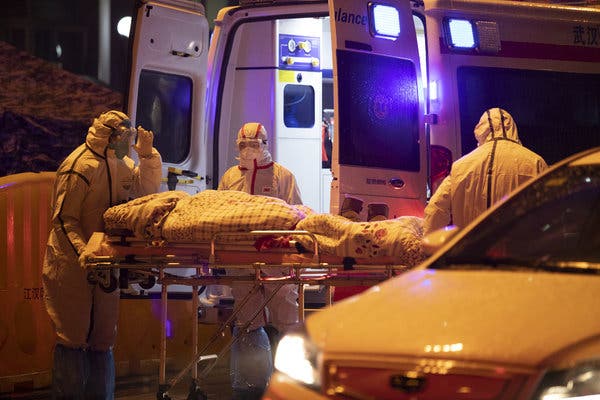
The death toll jumps as millions are caught up in lockdown.
The authorities drastically expanded a travel lockdown in central China on Thursday, essentially penning in more than 22 million residents to contain a deadly virus that is overwhelming hospitals and fueling fears of a pandemic.
The new limits — abruptly decreed ahead of the Lunar New Year holiday, China’s busiest travel season — were an extraordinary step that underscored the ruling Communist Party’s deepening fears about the outbreak of a little understood coronavirus.
Chinese health authorities reported on Friday that there have been 26 deaths from and 830 cases of the coronavirus, a sharp increase.
The death toll increased by more than a half-dozen in 24 hours, while the number of confirmed cases jumped by more than 200.
On Thursday morning, the authorities imposed a travel lockdown in Wuhan, the industrial city at the epicenter of the outbreak. Airlines canceled hundreds of flights to Wuhan, leaving thousands of people stranded. Later in the day, officials said they would also halt public transportation in the nearby cities of Huanggang, Ezhou, Zhijiang and Chibi, which are together home to more than nine million residents. And by Friday, restrictions had extended to Xiantao, Qianjiang and Enshi, three other cities that include large rural populations.
Two deaths have been confirmed outside the virus epicenter.
One patient died in the province of Hebei — more than 600 miles north of Wuhan — after contracting the coronavirus, the provincial authorities announced on Thursday.
Another death was confirmed in Heilongjiang, a province near the border with Russia more than 1,500 miles from Wuhan.
The disease had also been diagnosed in patients in Vietnam, Singapore, Japan, South Korea, Taiwan, Thailand and the United States.
In Wuhan, a city of 11 million where the outbreak began, anxiety and anger prevailed as worried residents crowded into hospitals and teams of medical workers in hazmat suits sought to identify the infected.
Hospitals in Wuhan make urgent appeals for supplies and help.
Hospitals and medical workers at the center of the outbreak made urgent appeals for supplies, as stocks of surgical masks and other equipment quickly flew off shelves.
“Shortage of medical supplies, request help!!!” the Wuhan Children’s Hospital said Thursday in a post on Weibo, a Chinese social network.
The hospital asked for donations of surgical masks, disposable garments, protective goggles and gloves.
Several other hospitals, including the Hubei General Hospital, Renmin Hospital of Wuhan University and the Central Hospital of Wuhan posted similar notices.
The central government on Thursday acknowledged the severe strain on resources, and the Ministry of Finance announced an urgent allocation of one billion renminbi, about $144 million, for epidemic prevention and control work.
State news media also carried reports of people volunteering to help ease the strain on health workers.
Young doctors at the Renmin Hospital of Wuhan University volunteered to take on additional shifts or to take over from colleagues with children, the state broadcaster CCTV reported.
A team of 30 volunteers in Wuhan have mobilized to drive doctors to and from hospitals, while others have offered to help the local Red Cross answer phone calls and publicize requests for help from hospitals, according to a report by the China Business Journal.
Reporting was contributed by Chris Buckley, Javier Hernández, Vivian Wang, Austin Ramzy, Elaine Yu, Tiffany May, Russell Goldman, Gillian Wong, Paulina Villegas, Steven Lee Myers, Denise Grady, Karen Zraick, Roni Caryn Rabin, Carl Zimmer and Rick Gladstone. Amber Wang, Albee Zhang, Claire Fu, Elsie Chen, Yiwei Wang and Zoe Mou contributed research.

